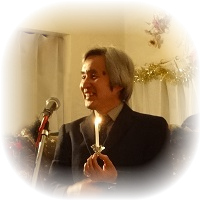↓メッセージが聞けます。(日曜礼拝録音)
【iPhoneで聞けない方はiOSのアップデートをして下さい】
前回は、ホセア書6章を取り上げました。そのテーマは、主に立ち返って生きることです。6章1節から3節には、「さぁ、主に立ち返ろう。主は私たちを引き裂いたが、また、いやし、私たちを打ったが、また、包んでくださるからだ。主は2日の後、私たちを生き返らせ、3日目に私たちを立ち上がらせる。私たちは、御前に生きるのだ。私たちは知ろう。主を知ることを切に追い求めよう。主は、暁の光のように、確かに現れ、大雨のように、私たちのところに来、後の雨のように、地を潤される。」とあります。人生を失敗したままで終えることは実に空しいことです。しかし、主に立ち返り、そして、豊かな実を結ぶ人生があるのです。この言葉は、たとえイスラエルの民が引き裂かれるような体験をしても、回復の時を神は用意していることを明らかに示しています。
今日はホセア書14章4節の言葉を取り上げます。そこには、「わたしは彼らの背信をいやし、喜んでこれを愛する。」と書かれています。神から離れてしまった北イスラエルの民もいつか神に立ち返るのです。そして偶像ではなく、誠の神への礼拝を捧げる民となるのです。ここにはそのような約束が書かれています。「わたしは彼らの背信をいやし、喜んでこれを愛する。」とあるのです。癒され、そして、神の愛に立ち返るユダヤの民の姿がここに、描かれています。
前回も今回も、最も美しい神の招きのみ言葉であると思っています。再度、6章1節と14章4節のみ言葉を比べて読んで見ます。「さぁ、主に立ち返ろう。主は私たちを引き裂いたが、また、いやし、私たちを打ったが、また、包んでくださるからだ。」そして、「わたしは彼らの背信をいやし、喜んでこれを愛する。」と続いています。神の招きと、神の応答が対比しています。北イスラエルの民もこれらの招きに応答するように、神に立ち返る、その決断をするのです。14章は、6章に続いての新たな招きの箇所です。それでは、14章に至るまでの新たな教えもいくつか選んでみます。これらは、新約聖書に続いていく新たな啓示であるとも言えます。いくつか見てみましょう。
ホセア書6章6節には、「わたしは誠実を喜ぶが、いけにえは喜ばない。全焼のいけにえより、むしろ神を知ることを喜ぶ。」と書かれています。マタイ9章13節で、イエスはこのみ言葉を引用し、パリサイ人に反論しています。イエスは罪人を招くために来られたのです。そして、神は、動物を捧げる形式的な礼拝よりも、一人一人が神に立ち返り、神との交わりを持って生きることを喜ばれるのです。謙遜になって、神と共に歩むことができる、そのような民を神は求めておられます。イエスはホセア書のこのみ言葉を引用して、罪人を招かれる神の大きな愛を教えています。残念ながらこの呼びかけに北イスラエルの民は気づくことがありませんでした。それゆえにホセアは、この北イスラエルはアッシリアによって滅ぼされることを明らかにしています。しかし、たとえそうであっても神は語りかけます。11章8節では、「エフライムよ。わたしはどうしてあなたを引き渡すことができようか。イスラエルよ。どうしてあなたを見捨てることができようか。」とあるのです。そして「わたしはあわれみで胸が熱くなっている。」と続いています。神の愛は無条件な愛です。確かに北イスラエルは、裁かれ、国を失い、捕囚とされますが、そこで神の愛に出会い、新たな歩みをスタートするのです。
13章1節の後半には、「しかし、エフライムはバアルにより罪を犯して死んだ。」とあります。この死は、アッシリアによる神の裁きの結果の姿です。13章6節には、「しかし、彼らは牧草を食べて、食べ飽きたとき、彼らの心は高ぶり、わたしを忘れた。」とあります。国が豊かになり、繁栄し、誠の神への信仰を失う、そのような事はどこでも誰にでも起こる可能性があります。一時的な豊かさが、彼らの信仰を弱めたのです。豊かになった時にどう歩むか、それは私たち一人一人に問われています。願わくは私たちは、どんなに豊かにされても、神に目を向け、礼拝を捧げる民であり続けたいです。13章14節には、「わたしはよみの力から、彼らを解き放ち、彼らを死から贖おう。死よ。おまえのとげはどこにあるのか。よみよ。おまえの針はどこにあるのか。あわれみはわたしの目から隠されている。」とあります。一度は滅ぼされますが、神の解き放ちと贖いの業がイスラエルに臨むのです。パウロは、第一コリント15章55節で、このみ言葉を引用し、イエスを信じる者たちの復活と勝利の約束を教えています。復活は、信仰者の希望です。
これらの教えの後に、14章で、神の前に立ち返えって生きるように、イスラエルの民にホセアは具体的にチャレンジをしています。14章1節では、「イスラエルよ。あなたの神、主に立ち返れ。あなたの不義がつまずきのもとであったからだ。」とあります。自分の罪を認めて、イスラエルの民は主に立ち返るのです。そして2節で、彼らはこのように神に語りかけます。「すべての不義を赦して、良いものを受け入れてください。私たちはくちびるの果実をささげます。」と。罪の赦しをいただき、霊的に回復して、彼らは心から神を礼拝する者となるのです。精一杯の捧げ物を、特にわたしの心からの賛美をあなたに捧げたいとの信仰の告白です。3節では、「アッシリアは私たちを救えません。私たちはもう、馬にも乗らず、自分たちの手で造った物に『私たちの神』とは言いません。みなしごが愛されるのはあなたによってだけです。」とあります。神に目を注いだイスラエルの民は、アッシリアやエジプトにより頼むことを止めるのです。そして、それ以上に、偶像により頼むことを止めるのです。それらのものを全て失っても、ちょうどみなしごのようになったとしても、神よ、あなたによって愛されるのですと、彼らは語りかけています。
4節には、「わたしは彼らの背信をいやし、喜んでこれを愛する。わたしの怒りは彼らから離れ去ったからだ。」とあります。彼らは、癒され、神の愛に立ち返り、新たな人生をスタートするのです。ちょうど私たち一人一人の歩みのようです。私たちも神に罪を赦され、神の愛をいただいて、心からの礼拝を捧げるようになるのです。
5節には、「わたしはイスラエルには露のようになる。彼はゆりのように花咲き、ポプラのように根を張る。」とあります。露を皆さん想像してください。雨がめったに降らない乾季の時期に、西の方から海風がふき、露が大地をおおい作物を潤していくのです。ちょうど神の定めた時、神の備えたもう露が地を潤して、ゆりも花咲き、ポプラはしっかりと根を張るのです。その姿は、神の祝福をいただいて、大地に深く根を張り、花を咲かせるイスラエルの民の姿です。そして6節には、「その若枝は伸び、その美しさはオリーブの木のように、そのかおりはレバノンのようになる。」とあるのです。豊かな収穫を得て、豊かな香りがイスラエルから放たれるのです。レバノンとありますが、レバノンには香りの強い植物が生育しており、香ばしい香りが満ちている所です。7節には、「彼らは帰って来て、その陰に住み、穀物のように生き返り、ぶどうの木のように芽をふき、その名声はレバノンのぶどう酒のようになる。」とあります。捕囚から戻り、神の保護の中に生かされるようになり、芽をふき、生き返って行くイスラエルの姿が生き生きと描かれています。
8節の前半には、「エフライムよ。もう、わたしは偶像と何のかかわりもない。わたしが答え、わたしが世話をする。」とあります。誠の神を偶像に変え、神の教えから離れてしまった北イスラエルに、神の回復が望むのです。神ご自身がこの民を愛し、その祈りに答え、神ご自身が世話をされる。そして豊かな収穫に預かる。その時がいつか来るのです。9節の前半には、「知恵ある者はだれか。その人はこれらのことを悟るがよい。」とあります。確かに、彼らの現状は惨めなものであったでしょう。しかし、その北イスラエルの民に、この神の約束を握り締めて、神に信頼して歩む者がいるのかと問いかけています。私は、この書が神の癒しと回復の約束で終えていることを嬉しく思っています。そして、神に目を注いで、これらのホセアの預言に応答して生きようとする信仰者が起こされたと信じています。神の招きに応答する者を、神は豊かに祝福されると心から信じているからです。
私たちクリチャンの人生はどうでしょう。たとえどんな大きな失敗をしても、神の愛は変わりません。私はあなたに立ち返ります。私の不義を赦してください。私はあなたを礼拝する者となりたいのですと、そのような心を持つ者でありたいです。信仰の目を持って、回復の約束をいただいて生きる者となって参りましょう。
(上のバーから聞けない方は青いボタンから)
iPhone




 English
English